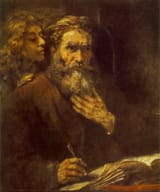>>17912734 (OP)
>>17912755
Juba II.
He was in Galilee up until Jesus could start to speak which coincided with Gaius Caesars death, at which point Mary and Joseph was sent westward to his personal libraries to educate him and shield them from the Herods and possible retaliation by Rome for letting Gaius Caesar "die of disease" in the region under Juba II's mentorship and babysitting. When Jesus was done with his education, he switched places with his father in Galilee in order to be Glaphyras secret stepson, due to Glaphyra having been married to Juba II for a year - to the Herods displeasement.
Juba II had used Gaius Caesar, Augustus' grandson and heir, as a sockpuppet in his expeditions and dealings in the region when it came to mapping out the conflict between the Herods, Armenians and other minor players in the wake of Egypts collapse.
Picrel is the coat of arms of Nimes where the "Square House" dedicated to Gaius and Lucius is located. The symbology is that of a Jubaensis palm tree guiding a shackled Basileus. Basically Juba II and his pet Gaius. Juba II was himself also referred to as the Basileus of Numidia and Mauretania.

